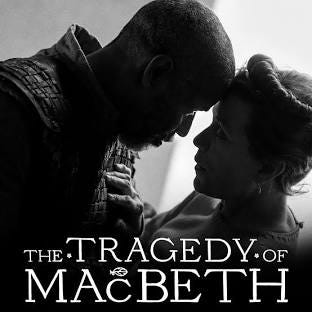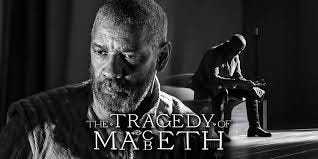Would Shakespeare have dug "Macbeth' on Apple TV?
Epic tragedy in shimmering black and white is timeless
Truth be told, teaching Shakespeare’s plays to high school students every year might be what I miss most about teaching. For a dozen years, I was always able to crank up “Hamlet” and “Macbeth” and sometimes, “The Tempest” for a few weeks out of the school year and delight in the transformation of the students and me.
When I would toss out that next week, we were doing Shakespeare, I’d enjoy the panic, the shocked, stunned looks on their faces. I’d have them write down what worried them. “The words, the language. We don’t be speaking like that.” They would say, collectively. Something along those lines.
“Give it a day,” I’d promise them, then. “By the second day, you won’t have any problem following what’s going on. You might even begin to remember it.”
That was me on a wet and nasty morning after a Florida night that resembled the night of Macbeth’s death; relentless storm, leaves and branches strewn everywhere, a world in upheaval.


Macbeth didn’t occur to me while the storm was roiling up above our heads. But the minute I looked outside in the morning light, I instantly thought of Shakespeare’s classic play and how, for many months now, I hadn’t sat and watched one all the way through. I needed to.
Especially considering recent developments, where themes like betrayal, megalomania, treachery — the timeless elements so infused in Shakespeare’s work that always make them relevant — it was time to pull up Apple TV’s stunning version of “The Tragedy Of Macbeth” with Denzel Washington and Frances McDormand in stark and sheening black and white, almost a purifying depiction of what some critics suggest was The Bard’s most perfect play. Did it still have something to say to me?
And the lines, the words. What surprised me was how quickly I remembered the lines, the report from the wounded warrior that opens the play “For brave Macbeth, well he deserves that name” to Macbeth’s opening and so foreshadowing a line “Ah, so foul and fair a day I have not seen…” and it all came right back, tumbling across my memory like a endless echo. Delightful.
Within minutes, I was back amongst the Thanes, with witches and treachery all around, just like now, really.
“All hail Macbeth and Banquo” — that would go over well now, too. All hail. Isn’t that what our king-to-be is looking for?
“Were such things here as we do speak about?” Banquo asks after seeing the witches, but he could be speaking for, why, half the country now. “Or have we eaten on the insane root that takes the reason prisoner?”
That IS a good question, isn’t it? It was a good question when Shakespeare wrote it in 1606 and seems particularly good now.
As is that line from Macbeth: “If chance will have me king, why, chance may crown me without my stir.” Why I might stand on a stage, play my greatest hits, sort of dance, ride in a garbage truck, refuse to discuss anything of substance and I’ll still be crowned.
Macbeth sends a letter home. How they had that kind of delivery service back then is hard to fathom. But here is Lady Macbeth reading his account of the witches’ forecast, of “what greatness is promised thee.” (and him.)
Yet, after reading it, Frances McDormand burns that letter and muses over the possibility of her husband becoming king. She frets.
“Yet do I fear thy nature,” she says. “It is too full of the milk of human kindness to catch the nearest way.’ That made me laugh out loud. Our soon-to-be king is full of many things, McDonald’s in particular, but the milk of human kindness sure ain’t one of them.
“Thou wouldst be great,” she continues — as she could right now. “Art not without ambition. What thou wouldst highly, that wouldst thou holily. Would not play false, and yet wouldst wrongly win.” More laughter. “Wrongly win.” He’d be fine with it.
Good king Duncan, appreciative of Macbeth and Banquo’s heroism decides to pay a visit to the Macbeth home, a sign of great trust. He will not leave alive, as we know. And conscience, that relentless worm in the brain, so to speak, using contemporary events, ends up destroying both Lady Macbeth and ultimately, through his own paranoia, appointing all sorts of unsuitable, scandal-ridden, lost souls to do his bidding, why, the parallels are daunting.
Ultimately, as we know and are relieved to see, there is a final duel, evil Macbeth is killed, removed from the throne and order is restored in the kingdom.
As Shakespeare’s plays continue to demonstrate, history does repeat itself or, at least, as Mark Twain said, it rhymes.
In Macbeth’s case, those rhymes are delivered in iambic pentameter “a type of poetry that imitates natural speech rhythms.” And when we hear these closing lines, we offer a silent prayer. At least I do.
“Life is but a walking shadow, a poor player that struts and frets his hour upon the stage and then is heard no more.”
We can only hope.




Every friend who's ever expressed anxiety about Shakespeare, I helped quiet their fears simply by reading some passage aloud. the lines were meant to be heard, not read, as you well know.